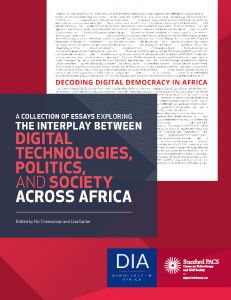
From the mid-2000s onwards, the “digital revolution” raised hopes of democratic transformation and strengthening in Africa. Yet, today, this techno-optimism co-exists with the techno-pessimist realization that digital technologies can also be used to sustain authoritarianism and that social media may exacerbate distrust and ethnic tensions. How, then, should we make sense of the complex interplay between digital technologies, politics, and society? This collection of 20 essays both summarises and advances the latest research and policy debates, enabling a fresh and timely understanding of some of the biggest issues facing the continent today – from internet shutdowns and AI regulation to social media mobilization, disinformation, and government surveillance. Written by leading scholars and civil society voices, the essays highlight a range of critical issues and key trends, opening up a vibrant research agenda.
This compiled collection is the result of a collaboration between Democracy in Africa and the Digital Civil Society Lab. It includes four contributions by DCSL members Julie Owono, Nanjala Nybola, ‘Gbenga Sesan and Toussaint Nothias, and was co-edited by Nic Cheeseman (University of Birmingham) and Lisa Garbe (University of St Gallen).
